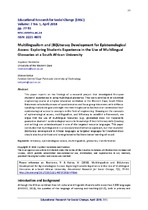| dc.contributor.author | Nomlomo, Vuyokazi | |
| dc.contributor.author | Katiya, Misiwe | |
| dc.date.accessioned | 2018-06-18T07:40:13Z | |
| dc.date.available | 2018-06-18T07:40:13Z | |
| dc.date.issued | 2018 | |
| dc.identifier.citation | Nomlomo, V. & Katiya, M. (2018). Multilingualism and (bi)literacy development for epistemological access: Exploring students experience in the use of multilingual glossaries at a South African university. Educational Research for Social Change, 7(1): 77-93. | en_US |
| dc.identifier.issn | 2221-4070 | |
| dc.identifier.uri | http://dx.doi.org/10.17159/2221-4070/2018/v7i1a6 | |
| dc.identifier.uri | http://hdl.handle.net/10566/3814 | |
| dc.description.abstract | This paper reports on the findings of a research project that investigated first-year students’ experiences in using multilingual glossaries. They were enrolled in an electrical engineering course at a higher education institution in the Western Cape, South Africa. Data were collected by means of questionnaires and focus group interviews with isiXhosa-speaking students to gain an insight into how the glossaries facilitated or constrained their epistemological access to concepts in the field of engineering. Drawing on the concepts of epistemological access, multilingualism, and biliteracy to establish a framework, we argue that the use of multilingual resources (e.g., glossaries) does not necessarily guarantee students’ epistemological access to knowledge if their biliteracy skills (reading and writing) are underdeveloped in one of the targeted resource languages. This paper concludes that multilingualism is a necessary transformative approach, but that students’ (bi)literacy development in African languages as targeted languages for transformation should also be prioritised and strengthened to facilitate better learning all round. | en_US |
| dc.language.iso | en | en_US |
| dc.publisher | NMMU | en_US |
| dc.rights | © 2018 Vuyokazi Nomlomo and Fundani
This is an open access article distributed under the terms of the Creative Commons Attribution Non-Commercial License, which permits unrestricted non-commercial use, distribution, and reproduction in any medium, provided the original author and source are credited. | |
| dc.subject | Biliteracy | en_US |
| dc.subject | Epistemological access | en_US |
| dc.subject | Multilingualism | en_US |
| dc.subject | Glossaries | en_US |
| dc.subject | Transformation | en_US |
| dc.subject | Recent publications | |
| dc.title | Multilingualism and (bi)literacy development for epistemological access: Exploring students experience in the use of multilingual glossaries at a South African university | en_US |
| dc.type | Article | en_US |
| dc.privacy.showsubmitter | FALSE | |
| dc.status.ispeerreviewed | TRUE | |

